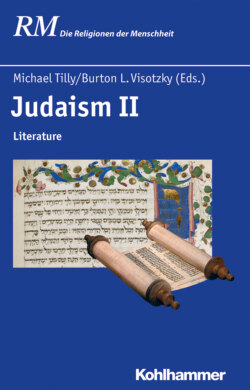Читать книгу Judaism II - Группа авторов - Страница 74
На сайте Литреса книга снята с продажи.
3 Fragments of Hellenistic-Jewish Historians
ОглавлениеThe Fragments of Hellenistic-Jewish Historians19 are preserved incompletely in the Christian tradition. They may be regarded as early witnesses to the use of the Greek language and literary forms in ancient Judaism. All of these Jewish writings, quoted by Alexander Polyhistor in his compilation, »On the Jews,« and taken from there into the works of Eusebius of Caesarea and Clement of Alexandria, represent significant examples of the interdependence of a traditional way of life and Hellenistic culture. They aid the historical reconstruction of Jewish life and Jewish teachings of the era. They are important for early traditions of understanding and interpreting Jewish scriptures.
The Jewish historian Eupolemos is an early witness to the use of the Torah in Greek translation. He wrote around 150 BCE, probably in Palestine (cf. 1 Macc 8:17f.; 2 Macc 4:11). In his »History of the Kings of Judah,« only five quotation fragments of which are extant,20 he used a Greek version of the books of Chronicles alongside the Hebrew text of the Bible, which is evident from frequent echoes of the Greek wording of these writings. Moreover, his chronology for the period between Adam and Moses seems to follow Greek tradition.
Eupolemos the historian is to be distinguished from an anonymous Samaritan author under the name of Pseudo-Eupolemos. This work emerged in the second century BCE, in single fragment.21 The highlighting of the Samaritan sanctuary on Mount Gerizim and the reception of older legends of the patriarchs, in particular the naming of Abraham as the first inventor and teacher of astrology are notable in that fragment.
In the mid-second century BCE, the Alexandrian Jewish writer Artapanos wrote a work »On the Jews,« three fragments of which survived.22 These fragments depict Abraham as the inventor of astrology, Joseph as the inventor of surveying, and Moses as a creator of religion and culture in Egypt. The latter, a midrash-like retelling of Ex 1–17, accentuates the principle of the superiority of Judaism over the Egyptian cultures.
Two works were handed down together pseudepigraphically under the name of the popular Greek historian Hecataeus of Abdera (ca. 300 BCE). Each are preserved in two fragments,23 by two different Egyptian Jewish authors. The first assumes a non-Jewish position in his propagandistic description of Judaism around 100 BCE (mention is made of Moses, the Exodus, and the Babylonian Exile), while the second gives an apologetic discussion of the life of Abraham as the first monotheist and his relationship with the Egyptians.
